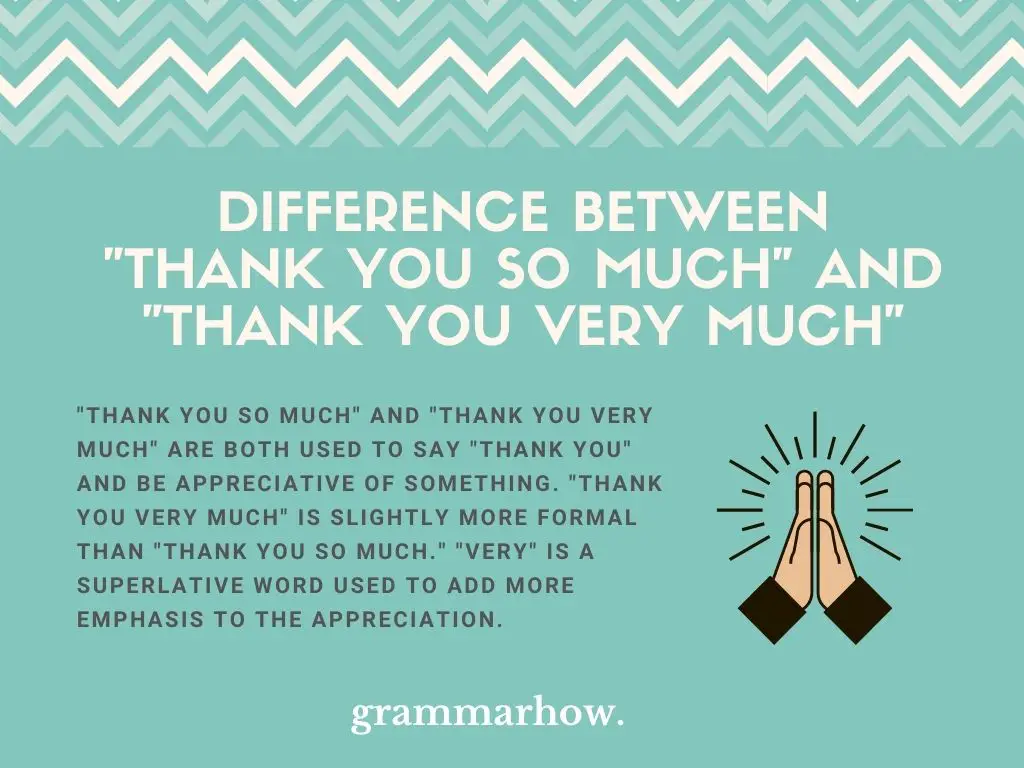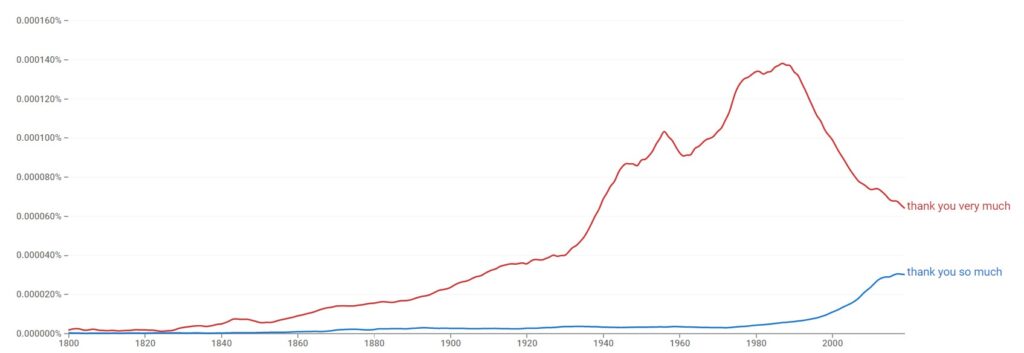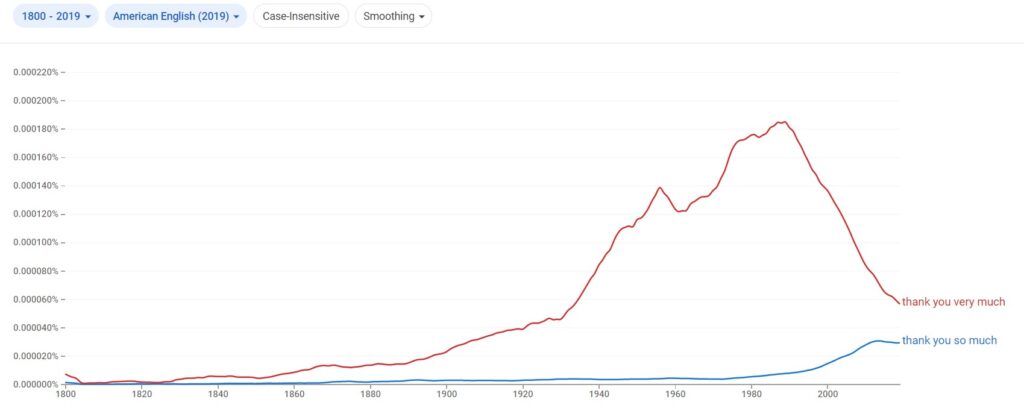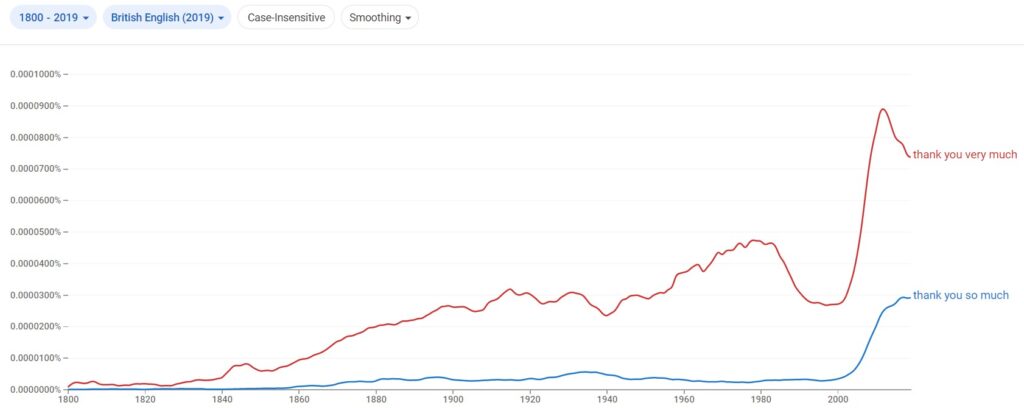There isn’t a major difference between saying “thank you very much” and “thank you so much.” However, there are some subtleties that it’s important to talk about. In this article, we’ll explore what those major differences are and how you can start using them yourself.
What Is The Difference Between “Thank You So Much” And “Thank You Very Much”?
“Thank you so much” and “thank you very much” are both used to say “thank you” and be appreciative of something. “Thank you very much” is slightly more formal than “thank you so much.” “Very” is a superlative word used to add more emphasis to the appreciation.

Many people believe that “thank you very much” is more sincere. However, this is not always the case. In fact, it mostly depends on what part of the world you come from and what English is spoken in that region or country.
For example, some more enthusiastic English speakers are more likely to use the superlative form “thank you very much” when they want to share their gratitude. In this way, you can think of countries like the USA, who use “thank you very much” more often than “thank you so much.”
On the other hand, if you’re looking at a slightly more reserved country with less emphasis on appreciation, you might hear “thank you so much” more often. Great Britain is a good example of a country where “thank you very much” is less common.
Still, in both countries mentioned above, both forms are still widely regarded. Also, in both countries, “thank you very much” is considered the more formal of the two phrases, so it is more common to use in the workplace.
Is “Thank You So Much” Or “Thank You Very Much” Used The Most?
To help you understand what we’ve been talking about, we’ve got a graph to show you the differences in popularity. We’ve included both “thank you so much” and “thank you very much” and how much they have appeared in literature over the last two centuries.
As you can see here, “thank you very much” is the more popular choice. It has also been historically the more applicable variation. It seems that “thank you so much” has only gained traction in the last 20 or so years, so it might become more popular as time goes on.

We’ve also done the number crunching and found that according to Google, “thank you very much” is mentioned 5,350 times on The New York Times website, while “thank you so much” is mentioned 3,000 times.
“Thank you so much” is definitely the “younger” of the two phrases. Using “so” as the emphasizer is a more recent addition that many people are slowly starting to pick up on. It might take a few more years, but there’s a potential that “thank you so much” might end up being more popular.
Is “Thank You So Much” And “Thank You Very Much” Used Differently In American English And British English?
We’ve briefly written about the differences between the two phrases in American English and British English. However, a lot of those differences have to do with spoken English rather than written English.
To demonstrate our point, here’s a graph showing its popularity in American English. You’ll notice it follows the same lines as the general English one does above. “Thank you very much” is more popular, but it’s slowly declining, while “thank you so much is improving.”

To contrast that, here’s the graph in British English. It looks much different than the other two. “Thank you very much” is still more popular (which contradicts what we said earlier). However, this popularity is in written English (which is more formal than spoken English).

In spoken English, it’s more common for a British English user to say “thank you so much.” Spoken rules are much tamer than written rules, so there’s less pressure.
American English generally prefers “thank you very much” in both spoken and written English. British English prefers “thank you very much” in written English, but “thank you so much” in spoken English.
If I Am Not From The US Or The UK – Should I Use “Thank You So Much” Or “Thank You Very Much”?
If you’re not from the US or the UK, you might be asking yourself which one works best for you. The truth is, there isn’t one single answer we can give you. That’s great news though because it means you can decide for yourself!
Generally, non-English-speaking countries follow British English rules. That means “thank you very much” in written English is correct and “thank you so much” in spoken English is more acceptable. There are no definitive rules that make this a necessity, though.
So, to keep things simple, both phrases mean “thank you” to a greater extent. If you want to show someone that you’re grateful for something, you can use whichever one suits you best at the time.
No native speaker will say you’re incorrect if you use one over the other. Both forms are acceptable. However, if you want to stay formal, maybe “thank you very much” in all cases is the safest bet.
Is “Thank You Very Much” Formal?
The formality of the phrases is the only real difference you can notice between them.
“Thank you very much” is formal and frequently used in the workplace or other formal mediums to show appreciation.
- Thank you very much for completing those assignments.
- Thank you very much for the compliments in the email, sir.
Many people believe it to be slightly more formal than “thank you so much” because it adds a bit of emphasis with the word “very” without feeling like it’s said sarcastically or without care (which is the effect “so” can sometimes have).
However, just because “thank you very much” is generally accepted as the more formal of the two doesn’t mean it can’t be used in informal situations. In fact, it’s very common to use “thank you very much” in casual conversations or to thank your friends for something.
Is “Thank You So Much” Formal?
While not the most formal of the two phrases, there are still plenty of times where “thank you so much” has its use.
“Thank you so much” is less formal than “thank you very much.” To avoid any potential issues with using the wrong tone, you’re better off using “thank you very much” in formal situations.
- Thank you so much for helping me move house!
- Thank you so much for being there for me when I needed it.
Saying that, most British English users are happy to hear “thank you so much” in formal situations. It’s only American English that might have problems related to using it.
As we’ve previously stated, your best bet is to stick with using “thank you very much” when speaking or writing formally. Some people do find “so much” to be slightly more sarcastic and careless.
Is It Correct To Say “Thank You All Very Much”?
Let’s go over a few other variations you might come across when saying “thank you” in some form.
“Thank you all very much” is correct to say when you’re addressing a group of people. “All” in the word applies to more than one person without naming them directly, which means you always need to address a group to use it.
If you’re trying to thank one person, then “thank you all very much” is always grammatically incorrect.
- Thank you all very much for the card you signed!
- Thank you all very much for making me feel so welcome.
You might also like: Is It Correct To Say “Thank You All”? Learn It Here! (+5 Alternatives)
Is It Correct To Say “Thank You So Very Much”?
“Thank you so very much” is much less formal than any other variation. It’s mostly used as a sarcastic phrase, using both “so” and “very” to over-emphasize the gratitude – which makes it seem less genuine.
People who say “thank you so very much” often don’t mean it. If they are trying to convey genuine gratitude, then they’re better off using one of the other variations we explored in this article.
- Thank you so very much for the effort you put into this work. (If the work wasn’t up to the standard you wanted)
- Thank you so very much for trying your hardest. (If you’re disappointed with the effort someone put in).
Is It Correct To Say “Thanks So Much”?
“Thank so much” is correct to say, though “thanks” is more informal than “thank you.” You want to use this more often in informal or casual situations rather than in the workplace.
“Thanks” is one of the most common and popular ways to appreciate something. It’s the shortened form of “thank you,” which makes it easier to say and quicker to write. However, because it is shortened, it is not generally accepted as a formal phrase.
- Thanks so much for being there for me last night.
- Thanks so much for being the best bunch of friends anyone could ask for.
If you want to learn more about how to use “thanks so much”, take a look at this article: Is It Correct to Say “Thanks So Much”?
Should I Place A Comma After “Thank You Very Much” And “Thank You So Much”?
Generally speaking, you don’t need to place a comma after “thank you very much” or “thank you so much.”
It’s most common to thank someone and then state what you’re thanking them for by doing the following:
- Thank you so much for helping me.
In this case, no commas are needed.
However, there is one case where you will need to add a comma after both phrases.
If you’re including a name of a person or object directly after “thank you very much” or “thank you so much,” you must include a comma before stating their name.
This is what we mean:
- Thank you very much, sir. I couldn’t have done it without you.
- Thank you so much, Jack. You’re the best friend I’ve got.
It doesn’t just have to be a proper noun (like “Jack”). It can also apply to a general noun, like “sir” or even “toothbrush” (though that would require you to thank your toothbrush for some reason).
8 Other Ways To Say “Thank You Very Much” And “Thank You So Much”
Finally, we want to talk about some alternatives you can use instead of “thank you very much” and “thank you so much.” We believe these are an excellent way to broaden your horizons and try a new way to say thank you.
We’ll look at:
- I can’t thank you enough
- Thank you kindly
- Many thanks
- Please accept my deepest thanks
- Thanks a million
- Cheers
- Thanks a bunch
- Much appreciated
The preferred version in a professional sense is “please accept my deepest thanks.” It’s the most formal form of saying thank you and is incredibly polite as well. In a friendly sense, “thanks a million” is a great way to stay casual while also emphasizing how grateful you are.
Professional Alternatives
We can split the alternatives into two key parts: the professional alternatives and the friendly alternatives. We’ll start by looking at the professional ones.
- I can’t thank you enough for helping me with this assignment.
- Thank you kindly for everything that you’ve done.
- Many thanks for being the best boss we could have asked for.
- Please accept my deepest thanks for all that you’ve done.
As you can see, these examples show how powerful professional alternatives can be. They’re longer than some of the other ones, but they’re excellent phrases to use to get across the formality of it all.
Friendly Alternatives
Now let’s finish with the friendly alternatives and how they can boost your gratitude in casual situations.
- Thanks a million for the present.
- Cheers for helping me out again, buddy!
- Thanks a bunch for the food!
- Your friendship is very much appreciated!
All of these examples work really well in a more casual way. We can always say any of the above (or other related contexts) whenever we’re addressing our friends and family.
We encourage you to explore your options when it comes to saying thank you or something similar. There are plenty of excellent choices out there, so have a look around.

Martin holds a Master’s degree in Finance and International Business. He has six years of experience in professional communication with clients, executives, and colleagues. Furthermore, he has teaching experience from Aarhus University. Martin has been featured as an expert in communication and teaching on Forbes and Shopify. Read more about Martin here.
